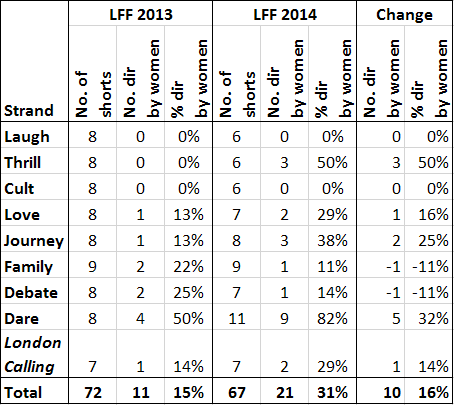The following is crossposted with the permission of the author. It was originally published here.
Last year, I posted this analysis of the huge underrepresentation of women among directors of short films featured in the BFI’s London Film Festival 2013.
How have things changed this year? Let’s have a look:

The overall proportion of short films directed by women across the festival’s nine programs has doubled since last year, from 15% to 31%. That’s an increase of 11 of 72 shorts last year to 21 of 67 shorts this year.
This is undoubtedly excellent progress and gives hope that, before too much longer, they’ll reach the vicinity of the 50–50 mark they should be striving for.
It’s a little concerning, however, that there’s still such disparity between the different strands. I’d be interested to know who programmed each of these shorts programs and whether this could go some way to explain the fact that, for the second year running, the Laugh and Cult shorts programs have no women directors at all, while Dare tops the chart again, but this time with an extraordinary 82%. Indeed the big imbalance in women directors’ favor in that a single program accounts for half the year-on-year increase.
Two data points is not a trend, however, so I’ll do this again next year!
And in the meantime I’ll continue to enjoy the diversity of full-length films elsewhere in this year’s festival. The Falling, with a near all-woman cast and a crew also refreshingly rich with women, was great, and the central character in 1001 Grams is that rarely portrayed being, a woman scientist. Meanwhile, Dear White People was a highly entertaining film striking blows for both race and (to a lesser extent) gender equality. It’s good to see some of the shorts programs have made moves in the right direction too.
Paul tweets @bitoclass.






